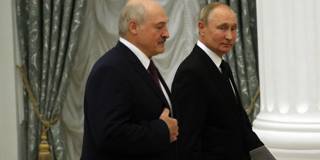Confronting the Kremlin's New Hybrid War in Europe
With the Kremlin intent on dividing and weakening the European Union, and now probing for vulnerabilities, Western powers must come together and issue a forceful response. History has shown that there must be no accommodation or turning a blind eye to Russian military, political, and economic provocations.

STOCKHOLM – As winter approaches, the Kremlin is instigating trouble in Europe. Its latest machinations include a gas war against Central and Eastern European countries; a migration crisis along Belarus’s borders with Lithuania, Latvia, and Poland; a renewed military mobilization on Ukraine’s eastern border; and agitation for Serbian secession from Bosnia and Herzegovina.